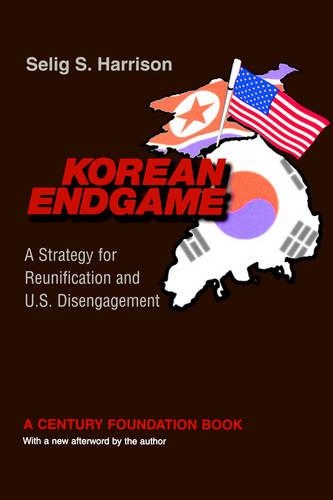
Korean Endgame: A Strategy for Reunification and U.S. Disengagement
(Paperback, Revised edition)
Publishing Details
Korean Endgame: A Strategy for Reunification and U.S. Disengagement
By (Author) Selig S. Harrison
Princeton University Press
Princeton University Press
29th October 2003
Revised edition
United States
Classifications
Professional and Scholarly
Non Fiction
Regional / International studies
327.7305193
Winner of AAP/Professional and Scholarly Publishing Awards: Government and Political Science 2003
Physical Properties
Paperback
448
Width 152mm, Height 235mm
652g
Description
Showing why North Korea is not - as many policymakers expect - about to collapse, this text challenges US policies in Korea designed to maintain a permanent military presence there even after reunification. It explains why existing US policies hamper North-South reconciliation and reunification and assesses North Korean capabilities and the motivations that have led to its forward deployments, spelling out the arms control concessions by North Korea, South Korea and the United States necessary to ease the dangers of confrontation.
Reviews
Winner of the 2002 Award for Best Professional/Scholarly Book in Government and Political Science, Association of American Publishers Finalist for the 2002 Kiriyama Pacific Rim Book Prize "At a time when North Korean nuclear developments have created a crisis in world affairs, we are fortunate to have this thoughtful and provocative book... [Harrison] covers a wide range of issues and much inside history, making this read ... valuable."--Foreign Affairs "At a time when North Korean nuclear developments have created a crisis in world affairs, we are fortunate to have this thoughtful and provocative book."--Lucian W. Pye, Foreign Affairs
Author Bio
Selig S. Harrison is a former "Washington Post" Bureau Chief in Northeast Asia and the author of five books about the continent. He served as Senior Fellow and Director of Asian Studies at the Brookings Institution and, for twenty-two years, as a Senior Associate of the Carnegie Endowment for International Peace. He has visited North Korea seven times and met the late President Kim Il Sung twice. He played a key role in setting the stage for the 1994 U.S. nuclear freeze agreement with Pyongyang.
